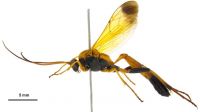ICHNEUMONIDAE: : Ichneumon Linnaeus 1758
Diagnosis:
Characteristics of Ichneumon include: 1. Body size 10-20mm; 2. Position of spiracle on T1 clearly behind the centre; 3. Shape of aerolet in forewing is pentagonal (closed); 4. Colour of face is variable, sometimes only black; 5. Metasoma compressed dorsal-ventrally; 6. Size of ocelli small; 7. Length of antennae is shorter than body; 8. Length of ovipositor is barely visible; 9. Wings present; 10. Colour of wings completely or almost completly infusciate (darkened); 11. Sternaulus absent; 12. Shape of face in lateral view is flat or only weakly bulging; 13. Sternite on T1 (viewed laterally) not extending past spiracle; 14. Shape of T1 (viewed laterally) evenly curved or humped; 15. Number of teeth in mandibles 2; 16. Patterns on metasoma bicoloured (bands); 17. Length of T1 vs T2 subequal in length; 18. Sculpture on mesoscutum finely pitted, many hairs; 19. Width of T1 (viewed dorsally) with anterior part slender often parallel, strongly widening behind spiracle; 20. Glymma on T1 absent; 21. Sculpture on metasoma is punctured (sometimes less densly or densly punctured); 22. Propodeum reaching past coxal insertion, but not reaching halfway along metacoxae).Similarity to Other Taxa
Ichneumon is a large-sized Ichneumonid in New Zealand. It is similar in size to: Lissopimpla , Echthromorpha , Ophion (1 species), Enicospilus , Eutanyacra , Rhyssa , Netelia , Xanthocryptus , Ctenochares , and Degithina .Ichneumon has darkened forewings, which is rare in New Zealand Ichneumonids. In this regard it is similar to Lissopimpla but Ichneumon have the spiracle on T1 well behind the centre.
Ichneumon is similar to Eutanyacra in terms of body size and overall colour; a mix of black, red and white spots/bands. However, Ichneumon does not have white/yellow spots on the mesopleuron and metapleuron [present in Eutanyacra ], and the lateral carina on the propodeum are only very weakly developed (a pointed ‘spine’ in Eutanyacra ).
Compare
-

Ctenochares
Has different colourations in the forewing. -

Echthromorpha
Has different colourations in the forewing. -

Enicospilus
Has large distinct ocelli. -

Ophion
Has large distinct ocelli. -

Netelia
Has large distinct ocelli. -

Degithina
Does not have conspicuous gastroceoli (a broad sunken concavity on tergite 2), as in Ichneumon. Also the posterior of tergite 1 is broadened (flayed) with lateral ‘steps’ in Ichneumon.
Distribution in NZ
North Island: ND, AK, BP, CL, GB, HB, TK, WI. South Island: NN, NC, SD, BR, MB, MC, DN, CO, OL, FD, MK. Offshore Islands: KE, CH.
Species in NZ
Two species: Ichneumon lotatorius Fabricius, 1775 which is endemic, and I. promissorius Erichson, 1842 which is native and found in Australia and several Pacific Islands.Biology & hosts
A very large cosmopolitan genus which is comparatively poorly represented in the Australasian region (Gauld 1984). Ichneumon is widely distributed in New Zealand. Host records from New Zealand include: I. lotatorius from Wiseana cervinata (Lepidpotera: Hepialidae); and I. promissorius from Mythimna separata and Helicoverpa armigera conferta (Lepidpotera: Noctuidae). Ichneumon promissorius has also been recorded from species of Agrotis, Anticarsia, Helicoverpa, Heliothis, Persectania, Pseudaletia, Spodoptera and Trichoplusia (Lepidoptera: Noctuidae) overseas (Yu et al 2005).Sources of information
Gauld ID. 1984. An Introduction to the Ichneumonidae of Australia. London, British Museum (Natural History). 413 p.Parrott AW. 1953. The identity of two common species of ichneumon-wasps. New Zealand Entomologist 1: 15-16.
Valentine EW & Walker AK. 1991. Annotated Catalogue of New Zealand Hymenoptera. DSIR Plant Protection Report 4. General Printing Services, 84 p.
Yu DS, van Achterburg K, Horstmann K. 2005. World Ichneumonoidea 2004. Taxonomy, Biology, Morphology and Distribution. CD/DVD. Taxapad. Vancouver, Canada.
Citation
Ward DF & Schnitzler FR. 2013. Ichneumonidae of New Zealand. Genus Ichneumon http://ichneumonidae.landcareresearch.co.nzAccessed: 24 May 2025



